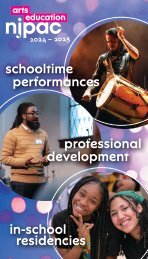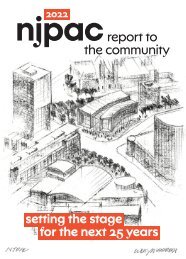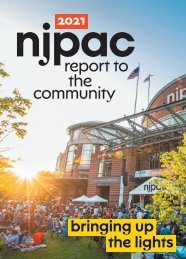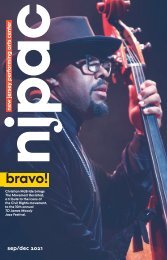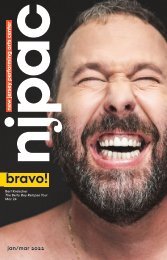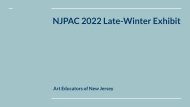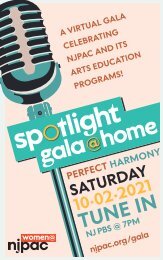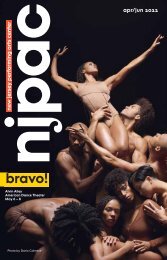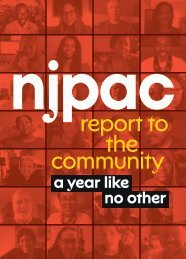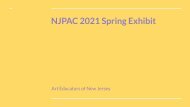You also want an ePaper? Increase the reach of your titles
YUMPU automatically turns print PDFs into web optimized ePapers that Google loves.
virtual<br />
summer arts<br />
camp<br />
jul 6 – 30<br />
Student and Family Handbook
contents<br />
NJPAC <strong>Arts</strong> Education Department Overview<br />
<strong>Arts</strong> Education Department 2<br />
NJPAC Staff 4<br />
NJPAC <strong>Summer</strong> <strong>Virtual</strong> <strong>Arts</strong> <strong>Camp</strong> Staff 4<br />
Important Contact Information 4<br />
NJPAC <strong>Virtual</strong> <strong>Summer</strong> <strong>Arts</strong> <strong>Camp</strong> Overview<br />
Faculty 5<br />
Technology Requirements<br />
& Google Classrooms Tutorial 6<br />
Attire 6<br />
Lunch 6<br />
Communication<br />
Family Communication/Contact Us 7<br />
Tuition 7<br />
Policies and Procedures<br />
NJPAC Privacy & Safety Policies 8<br />
Rules of Conduct 9<br />
Student Responsibility 9<br />
Student “Red Flag” Protocols 10<br />
Student Concern Protocols 10<br />
Teen Hotline 10<br />
Working with Minors Policy 10<br />
Social Media Policy 12<br />
Sponsors 13
njpac arts education<br />
department overview<br />
<strong>Arts</strong> Education at NJPAC<br />
<strong>Arts</strong> Education has been a central part of NJPAC’s<br />
mission since its inception. Even before the Center<br />
opened its doors, the <strong>Arts</strong> Education Department<br />
reached thousands of young people through its<br />
in-school and community-based programs. Ten<br />
years later, NJPAC boasts the fourth largest arts<br />
education department of its kind in the nation.<br />
We serve the entire state of New Jersey.<br />
Each season, over 60,000 children, families,<br />
and educators attend or participate in arts<br />
education programs. Part of the <strong>Arts</strong> Education<br />
Department’s mission is to continually explore<br />
new and innovative ways to use its resources<br />
to serve New Jersey students and educators.<br />
In this spirit, the <strong>Arts</strong> Education Department has<br />
developed partnerships with school districts,<br />
educational institutions, social service agencies<br />
and arts organizations statewide.<br />
The <strong>Arts</strong> Education Department currently consists<br />
of four core areas: school and family performances,<br />
in-school programs, arts training, and professional<br />
development for educators, which provide over 20<br />
programs for children, families, and educators.<br />
Located at 24 Rector Street (directly adjacent to<br />
NJPAC), the Center for <strong>Arts</strong> Education is a 30,000<br />
square-foot building that houses a 100-seat black<br />
box theater, two dance studios, a recital hall, seven<br />
classrooms, nine music practice rooms, and office<br />
space for NJPAC’s <strong>Arts</strong> Education staff.<br />
“Multiple independent studies have shown<br />
increased years of enrollment in arts courses are<br />
positively correlated with higher SAT verbal and<br />
math scores. ”<br />
(nasaa-arts.org/Publications/critical-evidence.pdf)<br />
2
Letter from Artistic Directors<br />
Hello Creatives!<br />
Welcome to summer <strong>2021</strong>! I find myself filled with<br />
hope and a desire for new beginnings. It’s been<br />
a year like no other. Who could have imagined?<br />
We’ve all learned to pivot, reinvent and dig deeper<br />
to find what’s genuinely important in life; what we<br />
must have to survive. Creativity and collaboration<br />
are two “must haves” for me. Of course, there is grit,<br />
and a questioning determination creative people<br />
possess. Together, we will shed our pandemic armor<br />
and look for our new normal. Although summer<br />
classes are virtual, we are interested in you as<br />
a creative person…as an artist citizen. What do<br />
YOU have to say after this past year?<br />
Our theme this summer is “Find Your Voice,” with<br />
a goal to amplify and strengthen what your artistic<br />
expression already might be or is to become. Let’s<br />
reconnect with joy, collaboration and creativity.<br />
To help, we’re got some fabulous teaching artists<br />
to guide you during our summer journey. I look<br />
forward to building our virtual community by<br />
offering you a platform to sing and act your way<br />
to our new beginning.<br />
Lisa Gunn-Becker<br />
Theater Artistic Director<br />
Peace Hip Hop Community,<br />
It is with an abundance of appreciation that I<br />
welcome you to our seventh hip hop summer season!<br />
Our program is evolving in the virtual space with<br />
extraordinary commitment from each community<br />
member! This year, the essence of our programming<br />
is centered around multidimensional perspectives in<br />
a shared space.<br />
Shared Space:<br />
We will work in harmony to contribute to<br />
each other through sharing ideas, time,<br />
and space!<br />
We will create a vibe as we make beats,<br />
raps, dance moves, graffiti/graphic<br />
designs and podcasts.<br />
We will use what we have to experience<br />
peace, love, joy and a lot of FUN!<br />
We will connect and create a vibe from<br />
moment to moment that works for all.<br />
We will contribute to the energy, vibe, and<br />
experience of one another.<br />
We will celebrate each person being<br />
themselves, sharing their ideas, time, and<br />
space for us to make what we imagine.<br />
Thank you in advance and we look forward to<br />
launching in 3, 2...1!<br />
Much Respect,<br />
Sheikia “Purple” Norris<br />
Hip Hop Art & Culture Director<br />
3
NJPAC <strong>Arts</strong> Education Staff<br />
(partial listing)<br />
Steven M. Goldman, Esq. & Barry H. Ostrowsky,<br />
Co-Chairs, NJPAC Board of Directors<br />
John Schreiber, President & CEO<br />
Jennifer Tsukayama, Vice President, <strong>Arts</strong> Education<br />
Meggan Gomez, AVP Faculty and Creative Practice<br />
Mark Gross, Director, Jazz Instruction<br />
Vicky Revesz, Director Program Operations<br />
Rosa Hyde, Director AED Performances and<br />
Special Event Operations<br />
Erica Bradshaw, Director, Theatre <strong>Arts</strong> Instruction<br />
Roe Bell, Senior Manager, School and Community Programs<br />
Danielle Vauters, Senior Manager, Programming and Performances<br />
Ashley Mandaglio, Senior Manager, Professional Development and Training<br />
Daniel Silverstein, Manager On-Site Programs<br />
Kristine Mathieson, Manager, In-School Programs<br />
Sheikia, Purple Haze Norris, Director, Hip Hop <strong>Arts</strong> and Culture<br />
Kim Washington, Manager, Marketing, Sales, and Recruitment<br />
Natalie Dreyer, <strong>Arts</strong> Integration Faculty Lead<br />
NJPAC <strong>Summer</strong> Program Managers<br />
Roe Bell, Sr. Manager, Schools and On-site Programs<br />
Daniel Silverstein, Manager, On-Site Programs<br />
Victoria Revesz, Director, Program Operations<br />
Important Contact Information<br />
Email: artseducation@njpac.org<br />
Staff: Roe Bell, Sr. Manager, Schools and On-site Programs<br />
973.307.0373<br />
Daniel Silverstein, Manager, On-Site Programs<br />
973.378.0656<br />
Vicky Revesz, Director, Program Operations<br />
973.297.5826<br />
4
njpac virtual summer<br />
arts camp overview<br />
Faculty<br />
<strong>Virtual</strong> <strong>Summer</strong> <strong>Arts</strong> <strong>Camp</strong> Co-Artistic Directors<br />
Lisa Gunn-Becker (Musical Theater & Acting/Devised Theater)<br />
Sheikia “Purple Haze” Norris (Hip Hop <strong>Arts</strong> & Culture)<br />
Acting Faculty<br />
Danielle Thompson<br />
Daryl Stewart<br />
Doriane Swain<br />
Nicola Murphy<br />
Rai Arsa Artha<br />
Hip Hop Faculty<br />
Adeola Fashina<br />
Ana Garcia<br />
Anthony Harris<br />
Boshia Burgess<br />
Carlos Cordova<br />
Derick Cross<br />
Eric Shandroff<br />
Gonzalo Silva<br />
Jennifer Moore<br />
Jerryl Sharif<br />
Karen Ng<br />
Malik Whitaker<br />
Spencer Frowirth<br />
Stephen Dent<br />
Musical Theater Faculty<br />
Alexander Ratner<br />
Lauren Palmeri<br />
Marion Drew<br />
Harper Levy<br />
5
Technology Requirements<br />
Students participating in the program will<br />
need access to a computer or tablet with internet<br />
connectivity, a webcam and microphone for the<br />
duration of the programming. Computer cameras<br />
should remain on for the full duration of the class.<br />
We will be using following platforms for<br />
this experience:<br />
• Zoom – Primary platform for<br />
classroom instruction.<br />
• Google Classroom – Primary repository for<br />
assignments and materials.<br />
NJPAC is not responsible for providing technology<br />
or individual technical support for this program. Our<br />
staff will make efforts to provide aid and instruction<br />
to reconnect the student in the event that technical<br />
difficulty is experienced.<br />
Attire<br />
Dress code requirements for specific disciplines will<br />
be provided by the faculty.<br />
The following rules apply: no cut-offs, provocative<br />
and/or vulgar t-shirts are allowed.<br />
Please dress in comfortable attire appropriate to<br />
your discipline.<br />
Students should be mindful of attire. Students<br />
should be camera-ready and wearing appropriate<br />
attire for class. (No pajamas or bathrobes).<br />
Lunch<br />
For students participating in an AM and PM<br />
session, please make sure you have your lunch<br />
prepared in advance. There is a one-hour break in<br />
between the AM and PM sessions.<br />
Important: A personal Gmail account is needed<br />
to access Google Classroom and Google Meet. This<br />
email should be different than the parent’s email.<br />
If the student does not have a Gmail account, no<br />
problem! It’s free to set one up, and our staff would<br />
be able to assist you if needed. This is required in<br />
order to participate.<br />
6
njpac virtual<br />
summer arts camp<br />
communication<br />
Family Communication<br />
In order for NJPAC to provide a successful<br />
experience for students, it is necessary for the staff<br />
and parents to work together and support each<br />
other. If you have questions or concerns related<br />
to the program, please email your questions to<br />
artseducation@njpac.org.<br />
You can also utilize Google Chat/Hangouts to<br />
contact artseducation@njpac.org using your gmail<br />
account. A manager or coordinator will respond to<br />
you as soon as possible.<br />
Parents/Guardians who have submitted their<br />
email address through the registration process<br />
will have access to Google Classrooms to view<br />
assignments and receive announcements.<br />
We will be using a text messaging platform called<br />
Remind to send you reminders and notifications<br />
about your students. If you receive a text message<br />
from NJPAC inviting you to Remind, please accept<br />
the invite if you would like to receive text message<br />
reminders from us. The invite is optional.<br />
If you are interested in learning more about<br />
<strong>Arts</strong> Education or connecting with other parents,<br />
please join our Facebook group to become<br />
a part of our growing community.<br />
facebook.com/groups/njpaccoffeetalk<br />
Students and families are not permitted to<br />
communicate with faculty or staff through any<br />
social media platforms including text messaging.<br />
Emails and calls to faculty must be through NJPAC<br />
email accounts and phone numbers.<br />
We are no longer using Acceptd as a form of<br />
communication. Please use one of the above<br />
options to communicate with NJPAC staff.<br />
Tuition<br />
The application fee and tuition are nonrefundable.<br />
If your child can no longer attend the program at<br />
any point, please notify NJPAC <strong>Summer</strong> <strong>Virtual</strong> <strong>Arts</strong><br />
<strong>Camp</strong> staff as soon as possible via<br />
artseducation@njpac.org.<br />
7
policy &<br />
procedures<br />
Acceptable Use Policy:<br />
<strong>Virtual</strong> Courses<br />
Although we are not physically in class, all NJPAC<br />
policies and procedures applicable to virtual<br />
courses continue to apply. By registering for and<br />
attending any virtual NJPAC <strong>Arts</strong> Education course,<br />
you agree to the following:<br />
Never Share Personal Information<br />
• Sharing and/or receiving personal information,<br />
including phone numbers, social security<br />
numbers, addresses, email addresses, dates<br />
of birth, and social media handles, such as<br />
Facebook, Twitter, Instagram, Snapchat,<br />
etc., by any student or parent/guardian<br />
in connection with any virtual NJPAC <strong>Arts</strong><br />
Education course is strictly prohibited.<br />
• NJPAC is not responsible if personal<br />
information is shared and/or received by<br />
any student or the student’s parent or<br />
guardian via Zoom, social media or any<br />
other virtual platform during our course<br />
• NJPAC is not responsible for any consequence<br />
arising from such sharing and/or receiving of<br />
personal information<br />
• NJPAC cannot call back any personal<br />
information shared and/or received by any<br />
student or the student’s parent or guardian<br />
once it has been shared<br />
• NJPAC will investigate incidents and<br />
complaints of personal information sharing<br />
and/or receiving and will take appropriate<br />
action, if warranted<br />
Pratice Online Safety<br />
• Notify a staff member or parent immediately<br />
if you come across information, messages,<br />
interactions with any other person involved<br />
with teaching or attending the class, or<br />
images that are inappropriate, threatening,<br />
dangerous, or make you feel uncomfortable<br />
platform, other than the platform designated<br />
for the course. Any communication with faculty<br />
and staff outside normal class time should<br />
take place through NJPAC emails and<br />
phone numbers<br />
Positive Communication<br />
• Respect the Center for <strong>Arts</strong> Education faculty,<br />
staff, and fellow students at all times<br />
• Bullying, profanity, and discriminatory<br />
language is strictly prohibited while using the<br />
NJPAC platforms designated for the course<br />
• Discrimination or harassment based on race,<br />
creed, color, national origin, nationality,<br />
ancestry, age, sex (including pregnancy),<br />
familial status, marital/civil union status,<br />
religion, domestic partnership status,<br />
affectional or sexual orientation, gender<br />
identity and expression, atypical hereditary<br />
cellular or blood trait, genetic information,<br />
liability for military service, protected hairstyle,<br />
and mental or physical disability (including<br />
perceived disability, and AIDS and HIV status)<br />
is strictly prohibited<br />
• Sending sexually explicit photos or messages<br />
is strictly prohibited while using the NJPAC<br />
platforms designated for the course<br />
Be Prepared for Class<br />
• Attend virtual class fully and appropriately<br />
dressed<br />
• Participation in NJPAC <strong>Arts</strong> Education is a<br />
privilege and we hope all students will take full<br />
advantage of the experience by concentrating<br />
on the activities and applying their energy in a<br />
positive manner<br />
• Any and all assignments must be submitted by<br />
the provided due dates<br />
• Students are NOT permitted to engage with<br />
faculty and staff through any social media<br />
8
Acceptable Use Policy:<br />
<strong>Virtual</strong> Courses (continued)<br />
For Parents and Guardians of Students Under 18<br />
• Parents or guardians must strictly monitor<br />
student internet use in connection with all<br />
virtual NJPAC <strong>Arts</strong> Education courses.<br />
That includes all provisions contained in this<br />
Acceptable Use Policy. The best way to keep<br />
students safe and on task is to have a parent<br />
or guardian who is present and involved<br />
Any failure to comply with the terms and conditions<br />
as outlined in this policy may result in disciplinary<br />
action, including removal from the virtual course.<br />
In the event you are removed from the course<br />
for failure to comply with any of the terms and<br />
conditions outlined in this policy, no refunds will<br />
be provided.<br />
Students are bound by all NJPAC policies and<br />
procedures, as well as applicable local, state, and<br />
federal laws.<br />
Rules of Conduct<br />
In order to maintain a happy and safe environment,<br />
students are expected to uphold and respect the<br />
following Rules of Conduct.<br />
NJPAC maintains a zero tolerance policy pertaining<br />
to physical actions against others, stealing, bullying,<br />
and disrespect for staff and property. These actions<br />
are disruptive and result in negative experiences<br />
for fellow students. The administrative staff reserves<br />
the right to suspend or terminate a student from<br />
the program at any time for failure to adhere to the<br />
rules and values of the program.<br />
Rules are established in order to enhance the wellbeing<br />
of the larger community. If students do not<br />
follow the Rules of Conduct, a warning will be<br />
given and parents will be notified. Any additional<br />
disciplinary issues will result in dismissal from the<br />
program. No refund of tuition will be given to any<br />
student asked to leave the program for Rules of<br />
Conduct infraction(s).<br />
Any student deemed in violation of zero<br />
tolerance policies will be immediately dismissed<br />
from the program.<br />
NJPAC maintains a zero tolerance policy on the<br />
following:<br />
1. Bullying or Cyberbullying*<br />
2. Vandalism<br />
3. Theft<br />
4. Disrespectful or vulgar behavior<br />
5. Disrespectful or vulgar language<br />
6. Involvement in any activity that is<br />
considered illegal<br />
Bullying/Cyberbullying*<br />
Bullying is when one or more children (the bully/ies)<br />
target a child (the victim) and that a reasonable<br />
person would know that the bully’s actions will<br />
have the effect of physically or emotionally harming<br />
the victim, damaging their property or insulting/<br />
demeaning the victim.<br />
(Adopted from the YMCA Policies and Procedures)<br />
Student Responsibility<br />
NJPAC <strong>Summer</strong> <strong>Virtual</strong> <strong>Arts</strong> <strong>Camp</strong>s are training<br />
programs for serious and committed students.<br />
All students are expected to abide by the rules of<br />
the program, and devote their time on a daily basis.<br />
All students will be advised by their instructors<br />
about materials required for class and students<br />
are expected to be prepared with the appropriate<br />
materials at each session. Students should check<br />
Google Classroom for their Meeting ID, assignments<br />
and announcements. If at any time it is determined<br />
that a student is not complying with the terms of<br />
the program as summarized in this <strong>handbook</strong>,<br />
NJPAC reserves the right to ask the student to<br />
leave the program.<br />
9
Student “Red Flag” Protocol<br />
Student Red Flag Protocol: (self-harm)<br />
If faculty member believes a student to be at risk<br />
for self-harm, the faculty and staff MUST follow the<br />
below actions:<br />
1. Faculty notifies the site managers<br />
immediately.<br />
2. Site managers will notify the supervisor and<br />
the parent/guardian(s) will be called.<br />
3. Supervisor will call NJ Children’s System of<br />
Care at 1-877-652-7624.<br />
4. If in-person, Staff and faculty remain with the<br />
student until NJ Children’s System of Care<br />
arrives at NJPAC to assess the situation.<br />
If necessary, call NJPAC security.<br />
5. Supervisor notifies NJPAC Human Resources.<br />
Student Concern Protocol: (depression anxiety)<br />
If faculty believes a student to be depressed or<br />
anxious but not at risk for self-harm, the faculty<br />
and staff MUST follow the below actions:<br />
1. Faculty notifies the site manager.<br />
2. Site manager will notify the supervisor and<br />
the parent/guardian(s) will be called.<br />
Teen Hotline—Available 24/7<br />
If you want to speak with someone,<br />
know that you are not alone.<br />
1-888-222-2228<br />
Working with Minors Policy<br />
Purpose and Scope<br />
NJPAC and the Center for <strong>Arts</strong> Education<br />
acknowledges and embraces its obligation to<br />
provide a safe and secure environment for minors<br />
participating in NJPAC programs and activities as<br />
they explore their creative talents through music,<br />
drama and dance. The protection and well-being<br />
of children under the age of 18 is of the highest<br />
priority for NJPAC and for those involved in its<br />
administration.<br />
The NJPAC Working with Minors Policy (the “Policy”)<br />
applies to all NJPAC sponsored activities and<br />
programs operating under the authority and<br />
direction of NJPAC and taking place: (i) on the<br />
NJPAC campus, in a residence hall and online<br />
courses; or (ii) at NJPAC sponsored off-campus<br />
programs and activities in which minors will be<br />
physically present and participating. The Policy<br />
establishes guidelines for those in the community<br />
who are involved in covered programs or activities<br />
and may work or interact with individuals under<br />
the age of 18.<br />
Definitions<br />
Minor for purposes of this Policy means any person<br />
under the age of 18 who is participating in a NJPAC<br />
sponsored or NJPAC sanctioned program or activity<br />
operating under the authority and direction of the<br />
Center for <strong>Arts</strong> Education, excluding on-campus<br />
guests or attendees at a public performance.<br />
Authorized Adults for purposes of this Policy<br />
means all individuals, ages 18 and over, paid or<br />
unpaid, who instruct, supervise, chaperone or<br />
otherwise oversee Minors in connection with NJPAC<br />
sponsored or NJPAC sanctioned programs<br />
or activities operating under the authority<br />
and direction of the Center for <strong>Arts</strong> Education.<br />
This includes, but is not limited to faculty, staff,<br />
students, parents, volunteers, interns, independent<br />
contractors, consultants, alumni, guest artists or<br />
other personnel who will participate in any way in a<br />
NJPAC sponsored program, event, performance or<br />
other organized activity that includes Minors.<br />
10
Working with Minors Policy (Continued)<br />
Prohibited Conduct<br />
The following practices and behaviors are strictly<br />
prohibited under this Policy. This list is not meant<br />
to be exhaustive:<br />
• Engaging in sexual activity or other<br />
inappropriate deliberate physical contact or<br />
horseplay with or in the presence of Minors.<br />
• Communicating electronically with Minors,<br />
except through NJPAC’s email system,or<br />
when absolutely necessary and related<br />
to a particular program or activity in which<br />
the Minor is participating. Sending sexually<br />
explicit photos or messages and “sexting”<br />
is strictly prohibited, as is any form of<br />
communication through social media.<br />
• Engaging in the use of, or providing Minors<br />
with, alcohol, drugs or other illegal substances,<br />
or being under the influence of alcohol,<br />
drugs or other illegal substances, during<br />
Minor programs or activities. This prohibition<br />
includes allowing those substances to be used<br />
by a Minor in the Authorized Adult’s presence.<br />
. • Disciplining Minors in any manner involving<br />
isolation, humiliation or corporal punishment.<br />
Any form of discipline must be constructive<br />
and appropriate, given the age of the Minor<br />
and the circumstances of the situation.<br />
• Engaging in abusive conduct of any kind,<br />
either verbal or physical, toward or in the<br />
presence of Minors. Bullying (including<br />
cyberbullying), hazing and initiations are<br />
strictly forbidden.<br />
• Picking up or dropping off Minors at<br />
the Minors’ homes, except if specifically<br />
authorized in writing by the Minors’ parents<br />
or legal guardians.<br />
• Making sexual materials or pornography in<br />
any form available to Minors or assisting<br />
them in any way in gaining access to<br />
such materials.<br />
• Making inappropriate or risqué comments to<br />
or in the presence of Minors.<br />
• Releasing a Minor’s personal contact<br />
information to third parties without the<br />
written consent of the Minor’s parent or<br />
legal guardian. Even with parental consent,<br />
such information may only be released in<br />
connection with a NJPAC sponsored program<br />
or activity in which the Minor is participating.<br />
• Photographing or making videos of Minors<br />
for other than program-related purposes. For<br />
program-related purposes, photos or videos<br />
may be taken only after the Minor’s parent<br />
or guardian has signed an appropriate waiver<br />
obtained from the Center for <strong>Arts</strong> Education.<br />
Use of any device capable of recording<br />
or transferring visual images is forbidden<br />
in showers, restrooms, locker rooms, dressing<br />
rooms or other areas where privacy<br />
is expected.<br />
• Retaliating against anyone who, in good<br />
faith, raises a suspicion or allegation of<br />
inappropriate conduct toward a minor.<br />
• Other than immediate family members, minors<br />
participating in NJPAC sponsored programs<br />
or activities may not have personal visitors<br />
on-campus or in the residence hall, except with<br />
the permission of the program director or in<br />
the case of emergencies. All visitors must agree<br />
to abide by NJPAC policies and procedures.<br />
• Policy violations will result in the suspension or<br />
revocation of visiting privileges.<br />
• Giving gifts of any kind to Minors.<br />
11
Working with Minors Policy (Continued)<br />
Using Touch Instruction<br />
Human touch is an essential component of<br />
instruction in dance, drama, and music.<br />
Illustrating a point about breath control, a<br />
woodwind professor presses on a student’s<br />
diaphragm. A dance teacher’s hand on a student’s<br />
body provides invaluable tactile feedback. It is<br />
understood and expected that instructors at NJPAC<br />
may use touch in order to guide their students<br />
toward greater artistry.<br />
The traditions of touch in a given art form may be<br />
less familiar to inexperienced students.<br />
Instructors in our programs will remain mindful<br />
of the students’ needs and expectations. In<br />
teaching minor students, for example, a NJPAC<br />
instructor cannot use touch in the same way that<br />
the instructor experiences it in his or her own<br />
professional training.<br />
Our faculty has been instructed to adhere to the<br />
following basic guidelines to help reduce the<br />
possibility of misunderstanding or discomfort:<br />
1. Limit touch to what is necessary and<br />
appropriate for the instructional point.<br />
2. People experience touch in different<br />
ways depending on factors such as<br />
cultural background, age, gender and<br />
personal experience.<br />
3. It can be helpful to explain at the beginning<br />
of instruction why, when and how you might<br />
touch a student. With minors, parents may<br />
find the information useful.<br />
4. Before using touch, consider giving a verbal<br />
cue about the touch and its purpose: “Let<br />
me adjust your wrist so your hand stays<br />
more horizontal.”<br />
5. Verbal cues can be especially important<br />
before touching sensitive areas, such as<br />
a student’s chest, pelvis, buttocks or<br />
upper thigh.<br />
6. Consider alternatives to touch, such as<br />
demonstration or verbal description.<br />
A description might explain the position<br />
or movement of the body part under<br />
consideration and of adjacent parts.<br />
Metaphor is another useful type<br />
of description.<br />
7. If a student seems uncomfortable or expresses<br />
any concerns about touch, acknowledge the<br />
matter. Immediately cease the contact and<br />
report the situation to the program director or<br />
department head as soon as possible.<br />
Social Media Policy<br />
NJPAC’s overall goal is simple: to actively<br />
participate online in a respectful, relevant way<br />
that protects our reputation, strengthens new<br />
relationships, and follows the letter and spirit of<br />
the law.<br />
The following rules apply when engaging in social<br />
networks while using NJPAC resources, when<br />
referring to or commenting on NJPAC in an official<br />
capacity, or when commenting about NJPAC<br />
business and operations-related material.<br />
• Post meaningful, respectful, true comments:<br />
be transparent, no spam, no remarks that are<br />
offensive, and nothing misleading.<br />
• Use common sense and common courtesy:<br />
Ask permission to publish or report on internal<br />
conversations at NJPAC. Make sure your<br />
efforts to be transparent don’t violate NJPAC’s<br />
privacy, confidentiality, and legal guidelines.<br />
No confidential NJPAC information may be<br />
disclosed online. If you have any doubt as<br />
to whether something is confidential, do not<br />
post it.<br />
• Don’t infringe on copyrighted material,<br />
including photo, video and music files.<br />
12
Social Media Policy (continued)<br />
• Don’t intentionally do anything to harm<br />
NJPAC’s relationships with artists, clients,<br />
vendors, partners, patrons or any other<br />
business relationships the <strong>Arts</strong> Center<br />
has, including other arts centers and<br />
performing arts venues, management<br />
companies, etc.<br />
• Don’t comment on anything related to<br />
NJPAC’s legal or financial matters.<br />
• Don’t participate in social media when the<br />
topic being discussed may be considered a<br />
crisis or could potentially be detrimental to<br />
NJPAC (i.e. a refund or protest situation).<br />
Even anonymous comments may be traced<br />
back to you or to NJPAC.<br />
• Online activities should not take away from<br />
your productivity while in class.<br />
Sponsored By<br />
Support provided by the McCrane Foundation, care of<br />
Margrit McCrane<br />
Generous annual support for NJPAC <strong>Arts</strong> Training<br />
programs is provided by:<br />
BD<br />
Healthcare Foundation of New Jersey<br />
The MCJ Amelior Foundation<br />
Merck Foundation<br />
NJ Advance Media<br />
Victoria Foundation<br />
WBGO Jazz 88.3FM<br />
Wells Fargo<br />
and an anonymous donor<br />
women@<br />
• Always pause and think before posting<br />
something. Is it appropriate to post publicly?<br />
Reminder: Any media inquiries (traditional such<br />
as print, radio, TV, or “new,” such as websites,<br />
blogs, and fan pages) must always be referred to<br />
the Public Affairs Department.<br />
Please use these URLs for the official NJPACcontrolled<br />
social networks. We hope you will<br />
“Follow” and “Like” NJPAC if you haven’t already,<br />
and actively participate online.<br />
facebook.com/NJPAC<br />
instagram.com/NJPAC<br />
instagram.com/NJPAC<strong>Arts</strong>Ed<br />
13




